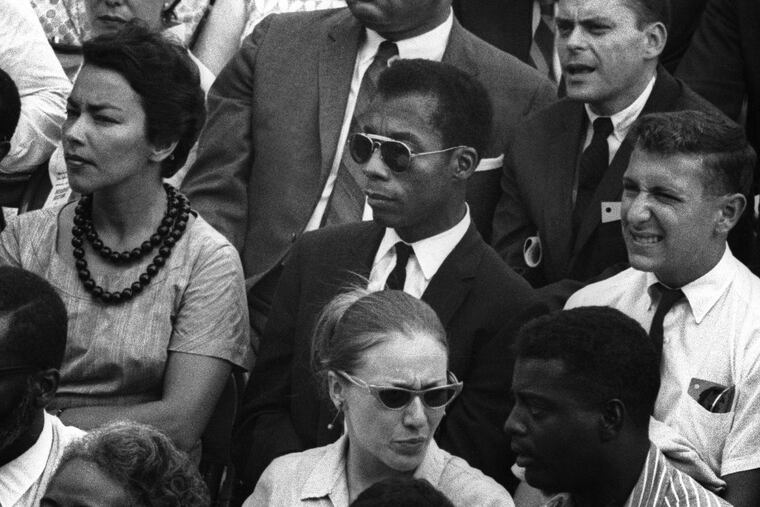Why James Baldwin still inspires 30 years after his death
A North Philadelphia celebration of James Baldwin is just one example of a resurgence in popularity of the author's life and works.

When Archishman Raju came to the United States from India four years ago to attend graduate school at Cornell University, he had never heard of the American writer James Baldwin.
Then in April, the 24-year-old accompanied a friend, a Penn graduate student, to a class taught by former Temple University professor Anthony Monteiro. The subject of the weekly Saturday Free School class: Baldwin.
Reading the prolific novelist and essayist introduced him to the history of the black struggle in America, something Raju, who travels from Ithaca, N.Y., for the classes, could compare to India's own anticolonialism.
"It's a critique of the social structure that functions not just in America but in the world," he said of Baldwin's writings.
Now Raju, who is pursuing a doctorate in physics, is an organizer of this weekend's James Baldwin Celebration, a three-day festival at North Philadelphia's Church of the Advocate that includes music, poetry, panel discussions, and screenings of the author's long-ago speeches and debates.
The man whose work coincided with the civil rights struggles of the 1950s and '60s seems to be enjoying attention by a new generation — 30 years after his death. In a world where unarmed black women, men, and children are being shot, his writings remain relevant and instructive — not just for Black Lives Matter activists but for feminists, for immigrants, for writers and artists:
The documentary I Am Not Your Negro, based on Baldwin's unfinished manuscript Remember This House and directed by Raoul Peck, was released in theaters in February.
Look at Twitter, and the #jamesbaldwin hashtag has been used more than 40 times in the last 24 hours, coinciding with no particular event. One is in Turkish.
At least a dozen books have been published about Baldwin since President Barack Obama was inaugurated in 2009, according to an article in the New York Review of Books. And writer Ta-Nehisi Coates, whose books include Between the World and Me, takes his inspiration from Baldwin, who died at age 63 in 1987, as he addresses current issues in race relations.
"No one has done more to popularize Baldwin in recent years than Ta-Nehisi Coates," the Review said. Coates has said rereading Baldwin's letter to his nephew in "My Dungeon Shook" was a springboard for Between the World and Me, written as a letter to the author's teenage son.
"…One did not have to be abnormally sensitive to be worn down to a cutting edge by the incessant and gratuitous humiliation and danger one encountered every working day, all day long," Baldwin wrote in his essay "Down at the Cross: Letter From a Region in My Mind," from The Fire Next Time.
" … When I was 10, and didn't look, certainly, any older, two policemen amused themselves with me by frisking me, making comic, (and terrifying) speculations concerning my ancestry and probable sexual prowess, and, for good measure, leaving me flat on my back in one of Harlem's empty lots."
In thinking up a tagline for the local celebration, Monteiro took from the eulogy of poet Amiri Baraka, where he called Baldwin "God's revolutionary mouth," and changed it to "God's revolutionary voice."
"He is a prophetic voice for fundamental change at a time of peak crises for the nation and the world," Monteiro said.
Raju said he and the friend who first took him to the classes participated in marches when the Democratic National Convention was in Philadelphia last year. But it was what he learned from Baldwin that gave him a chance to go beyond protest, he said.
"Baldwin has taught us that having sustained change in a society requires more than expressing anger and sorrow," Raju said. "It requires understanding the world and participation in sustained organizing."
Raju's friend Meghna Chandra, 26, will start a Ph.D. program in social welfare at Penn next month, and looks to Baldwin for his ability to diagnose what's happening with America "in terms of race relations, but not just in race, but how do human beings relate to one another."
"I think [Baldwin] has this integrity and clarity that nobody we read today really has. … He's an example to us as young people who want to change the world, who want to understand the world to change it."
While Baldwin wrote about the intense pain of enduring racism, he also wanted to reach out to white countrymen, who didn't understand the lives of black people, by confronting them with love.
Because of this, Baldwin was isolated from various blocs of the civil rights movement — an Uncle Tom to some African Americans while an "angry young man" to the establishment, Nathaniel Rich wrote in the New York Review of Books.
Still, he is gaining traction among new thinkers, and remaining relevant for longtime fans.
"I still refer to his writings when I need strength, and I'm feeling weak about doing these things as an activist and an artist," said Philadelphia poet Ursula Rucker, 49, who will read at the Baldwin celebration this weekend. "Just being an artist is [hard] enough. But when you're an artist who tries to speak up about something and make a change, some people don't want to hear it."
Events for the free James Baldwin Celebration will begin at 4 p.m. Friday and run through Sunday at the Church of the Advocate, 1801 Diamond St. For the schedule, go to www.baldwincelebration.org